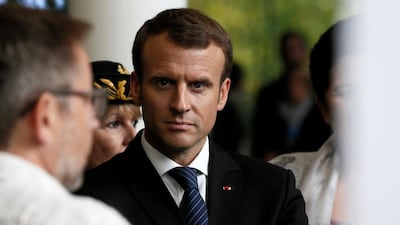Two years after its signing, the Paris climate change accord remains a global dividing line but the anniversary grants Emmanuel Macron an opportunity to display his international leadership at a high-profile summit.
Mr Macron hosts the One Planet Summit on Tuesday to encourage governments to harness both public sector resources and private finance to support innovate projects that accelerate the climate change fight.
The French president enjoys a strong standing abroad, travelling widely and hosting high profile events such as last week's conference on Lebanon. His domestic ratings are also rising, signalling approval of his handling of the nation’s top job.
While his radical labour reform decrees initially came under fire for hugely unpopular policy changes such as a cap on dismissal payouts and new rules making it easier to fire employees, approval ratings have since rebounded, in part as a result of his frenetic diplomatic activity.
Georgina Wright, a researcher in Chatham House’s Europe Programme, says the gap left by a leadership vacuum in the west including the UK and Germany, as well as America’s new direction under President Donald Trump, has cleared the world stage for Mr Macron to advance French priorities.
_______________
Read more:
Despite successes, Bonn climate talks fell short
Syria to join Paris climate pact, isolating US
_______________
“Taking the example of the One Planet Summit, this is obviously to mark the two year anniversary of the Paris Agreement, but there is a distinct emphasis on globalisation,” Ms Wright says.
“He really sees it as one of the greatest threats facing the world today but he also sees it as an opportunity to create really innovative business opportunities… this is an opportunity for French and EU’s business and as a chance for France to lead the dialogue on climate change,” she adds.
In his internationally bestselling book, Revolution, first published in France in November 2016, Mr Macron wrote outlined a mission to restore France to its former prestige by asking the French people that they should believe in themselves and their country.
This “Macronisme” could prove infectious, notes Ms Wright who says the president’s personality is key to his success.
“I spoke to someone recently who said to me president Macron is a ‘seducer’ and I really quite like this idea,” she said. “He is an excellent orator and he is also incredibly knowledgeable in terms of his education and his professional experience. He hasn’t had the traditional French politician path towards presidency, he launched his brand new platform which was very centrist and places the EU at the heart of that.
"He was able to mobilise a lot of people and those who felt generally disaffected from politics and the traditional left/right axis that has dominated French politics for such a long time. His personality matters a lot,” she added.
He himself declares his ambitions for France are both bold and will require determination. “If I don’t radically transform France, it’ll be worse than if I did nothing at all.”

